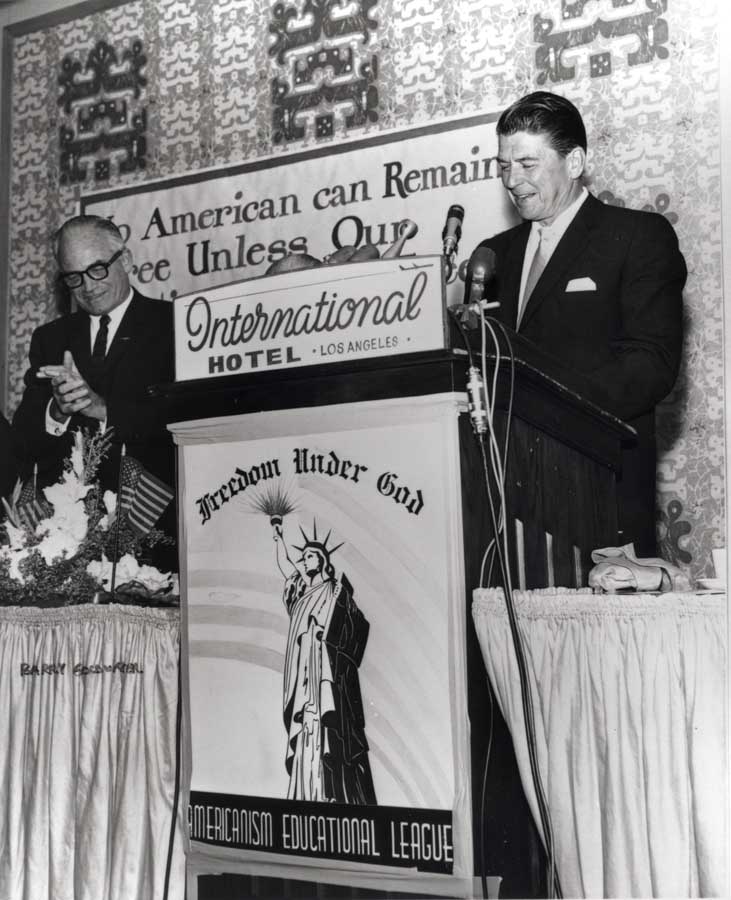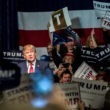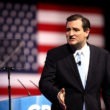Image source: Reagan Presidential Library
One day before President John F. Kennedy was assassinated in Dallas in November 1963, Richard Hofstadter was in London, delivering a lecture that a year later would appear in Harper’s as “The Paranoid Style in American Politics.”
At 47 years of age, Hofstadter was an American brand. He held an endowed chair at Columbia University—not to mention two Pulitzers. He was considered to be one of the finest historians and public intellectuals of his time.
Right-wing putschists led by Barry Goldwater (and the evidently immortal Phyllis Schlafly) had seized control of the Republican Party, muscling aside Nelson Rockefeller and the moderate wing he represented. Hofstadter was alarmed. “The Paranoid Style” was his red flag.
In the introduction to a 2007 Vintage Books collection of Hofstadter’s political writing, Princeton historian Sean Wilentz describes the 1964 essay as “a study of political cranks and zealots” in which the author described “a chronic, rancid syndrome in our political life.”
Indigenous and deeply rooted in American history, the paranoid politics Hofstadter described began with a panic among Federalists, echoed in New England’s pulpits in 1789, when preachers warned of the Bavarian Illuminati plots to undermine the new republic.
In the 1820s and 1830s the nation was seized with a fear of Masons, who were perceived to be a threat to republican government because Masonry was a secret society with its own system of loyalty and its own jurisdictions. Public hysteria about Masonic plots was followed by an anti-Catholic movement focused on the Society of Jesus, better known as Jesuits. “Anti-Catholicism has always been the pornography of the Puritans,” Hofstadter wrote.
All of this is understandable in a young nation defining itself and defending itself from external and internal threats. It’s when Hofstadter takes what he describes as the long jump to the contemporary right wing that the paranoid style of politics he describes speaks to our current political moment.
It doesn’t take much more of a leap to conclude that the same rancid syndrome, which Hofstadter chronicled as occurring in episodic waves in American political life, is upon us today, and the political cranks and zealots are Republican voters animated by Donald Trump, Ted Cruz, and Marco Rubio.
In the sixties, the country hadn’t entirely moved beyond McCarthyism, and the fear that the highest levels of the federal government had been infiltrated by communists who were selling out U.S. national interests. That particular obsession is largely a relic of the past, perhaps with the exception of religious loons such as Pat Robertson, and Rev. Rafael Cruz (father of Ted), who has referred to Barack Obama as a socialist aligned with Cuba’s Castro brothers.
Read “The Paranoid Style”—eliding the references to the communist menace—and you’ll discover an insightful analysis of the overheated rhetoric and reckless posturing that is the 2016 Republican presidential primary.
The American paranoids described by Hofstadter believed a political elite entrenched in New York controlled the media and “directed the public mind through managed news.”
Hofstadter quoted Harvard professor Daniel Bell’s description of “the modern right wing” of the 1960s. If Bell’s description weren’t so articulate, it could be passed off as briefing notes for Sarah Palin’s speechwriter.
America has been largely taken away from them and their kind; though they are determined to try and repossess it and to prevent the final destructive act of subversion. The old American virtues have already been eaten away by cosmopolitans and intellectuals; capitalism has been gradually undermined . . . the old national security and independence have been destroyed by treasonous plots, having as their agents not merely outsiders and foreigners but major statesmen at the very centers of American power.
The “modern right wing” of 2016? You can find it at a Trump rally in a Birmingham stadium or a Cruz caucus in Iowa—even with Palin on the hustings in New Hampshire—promising to take back our country from the intellectual elites who have dispossessed “real Americans.”
The American paranoids described by Hofstadter, like today’s MSM-averse Republicans, believed a political elite entrenched in New York controlled the media and “directed the public mind through managed news.”
Like today’s Republican presidential candidates, Hofstadter’s paranoids opposed the income tax and worked to repeal it. They were anti-intellectual and anti-cosmopolitan. They had a deep-seated aversion to “the democracies of Western Europe.” They harbored a “nativist desire to develop in North America a homogeneous civilization.” They envisioned the enemy eroding our values and undermining our national security: “A perfect model of malice, a kind of amoral superman, sinister, ubiquitous, powerful, cruel, sensual, luxury loving.”
Throw in “African-American”—which was beyond even the most febrile delusions of the hysterical conservatives of the 1960s— and you’ve almost got Rev. Raphael Cruz’s description of the sybaritic, foreign-born Muslim pretender to the American presidency.
How close are we to Yogi Berra’s “déjà vu all over again?”
Hofstadter’s essay quoted a New York Times story about conspiracy theorists who warned of a covert collaboration between the Department of Defense and the United Nations:
A United States Army guerrilla warfare exercise in Georgia, called Water Moccasin III, is actually a United Nations operation preparatory to taking over our country.
At the time, only one inconsequential three-term Congressman from Orange County, California, bought into the alleged plot that had President Kennedy dismantling the U.S. military and replacing it with a U.N. peacekeeping force.
Last summer, when a group of “patriots” in the small Texas town of Bastrop claimed that a routine training operation conducted by the U.S. Army was a covert U.N. mission, and that U.N. vans had been filmed in Walmart parking lots, Governor Greg Abbott deployed the Texas Guard to monitor the operation. As senator, Cruz directed his staff to begin an inquiry at the Pentagon.
Abbott recently travelled to Israel and Switzerland, and he has drafted a revised U.S. Constitution, which he intends to bring before a Constitutional Convention. He’s obviously positioning himself for something larger than elected office in Texas. Cruz, meanwhile, has a reasonable shot at his party’s presidential nomination. And Palin is back, sounding the alarm about the “leftists in Washington destroying our military.”
“Style has more to do with the way in which ideas are believed than with the truth or falsity of their content,” Hofstadter wrote. “I am interested here in getting at our political psychology through our political rhetoric.”
If political rhetoric is any measure of the moment, a short excerpt of the speech Sarah Palin delivered when she endorsed Donald Trump on January 19 illustrates how far around the bend the extremists in the modern Republican Party have gone.
Tell me, is this conservative? GOP majorities handing over a blank check to fund Obamacare and Planned Parenthood and illegal immigration that competes for your jobs, and turning safety nets into hammocks, and all these new Democrat voters that are going to be coming on over border as we keep the borders open, and bequeathing our children millions in new debt, and refusing to fight back for our solvency, and our sovereignty, even though that’s why we elected them and sent them as a majority to D.C. No! If they’re not willing to do that, then how are they to tell us that we’re not conservative enough in order to be able to make these changes in America that we know need to be . . . Now they’re concerned about this ideological purity? Give me a break! Who are they to say that? Oh tell somebody like, Phyllis Schlafly, she is the Republican, conservative movement icon and hero and a Trump supporter. Tell her she’s not conservative. How ’bout the rest of us? Right wingin’, bitter clingin’, proud clingers of our guns, our God, and our religions, and our Constitution. Tell us that we’re not red enough?
Palin might be considered a marginal figure by sensible moderates in both parties. But she’s revered on the far right, and in the 200 words above she addresses most of the paranoid fears of today’s right: a treasonous government selling out our sovereignty, coming after our guns, eroding religious rights, inviting aliens into the country to take our jobs, treating the Constitution with contempt. Palin managed to include in one over-the top speech most of what animates today’s Republican right wing—a constituency of “political cranks and zealots” who have moved far beyond the extremists Hofstadter described in an essay written half a century ago.
The Paranoid Style in American Politics, 2016
(Excerpts from a recent GOP debate.)
TED CRUZ: Well, sure, you put your finger on what the problem is. The current system isn’t fair. Washington is fundamentally corrupt. There are more words in the IRS code than there are in the Bible— and—and not a one of them is as good . . . This plan eliminates the payroll tax, eliminates the death tax, eliminates the corporate income tax, and it abolishes the IRS.
MIKE HUCKABEE: And I’m still one who says that we can get rid of the Internal Revenue Service if we would pass the fair tax, which is a tax on consumption rather than a tax on people’s income, and move power back where the founders believed it should have been all along.
DONALD TRUMP: I want security. I’m tired of seeing what’s going on, between the border where the people flow over; people come in; they live; they shoot. I want security for this country . . .
Let me just tell you that Dwight Eisenhower, good president, great president, people liked him. “I like Ike,” right? The expres- sion. “I like Ike.” Moved 1.5 million illegal immigrants out of this country, moved them just beyond the border. They came back. Moved them again beyond the border, they came back. Didn’t like it. Moved them way south. They never came back.
MARCO RUBIO: You know, 200 years ago, America was founded on this powerful principle that our rights don’t come from govern- ment. Our rights come from God . . .
But now as I travel the country, people say what I feel. This country is changing. It feels different. We feel like we’re being left behind and left out . . .
Because the damage [Obama] has done to America is extraordinary. Let me tell you, if we don’t get this election right, there may be no turning back for America. We’re on the verge of being the first generation of Americans that leave our children worse off than ourselves.







There’s always been an element of creepy projection in the Paranoid Style–like, if we say it’s happening Over There! OverThere! people won’t notice so much when the practitioners of TPS are actually, y’now, doing it themselves:
“… the old national security and independence have been destroyed by treasonous plots, having as their agents not merely outsiders and foreigners but major statesmen at the very centers of American power.”
Nixon and the Paris Peace talks? The October Surprise? Iran Contra? The Iraq invasion?
Irony just put her head down and wept.